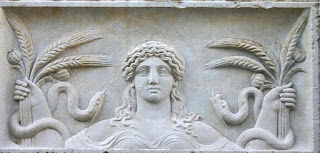The Wrong Sword
Ted Rabinowitz' Blog for All Things Nerdy, including "The Wrong Sword," "Conjure Man," and "Hero's Army."
Sunday, March 9, 2025
Viva el Presidente!
Tuesday, March 4, 2025
Rant! (Une hommage du M. Ellison)
You're at a party. The hors d'oeuvres are tasty, the drinks are strong, the people are pretty. You're talking to this one guest and you find out she's a doctor. So you roll up your pants leg and ask her about your rash.
Kidding!
Of course you don't do that.
Because you're cool.
You also don't ask the attorney how to sue your neighbor and his yapping dog, or the teacher if that was really his first job choice. It's basic etiquette; and for the most part, I'm glad to say I travel in circles where it's understood. Alas, if you (like me) publish a blog, are signed up to a dating site, or are introduced around as a writer, you will occasionally encounter people who just don't get it. For the benefit of those people - and anyone who interacts socially with professional writers - here are some things you don't say to a writer.
1. I might steal that line. I get paid to write good lines, most recently by the president of a prestigious university that shall remain nameless. So the fact that you like my line enough to repeat it, take credit for its wit, and pay me nothing is not a compliment. Your good opinion isn't worth $400 an hour, internet stranger.
Sunday, November 24, 2024
Thanksgiving Advice for a Moist, Flavorful Turkey
" Cheesecloth."
You're welcome.
[Okay, okay - once the turkey has finished cooking, soak the cheesecloth in the drippings and drape it over the bird until you're ready to carve and serve. It really works.]
Wednesday, October 30, 2024
Every Book Is a Conversation
Every book is a conversation between the author and the society in which the book was written, even when the book is science fiction or fantasy. That's why there are now generational divides in fandom. It was inevitable. if a genre lasts long enough, "classics" fade and are replaced.
The divides have been more bitter because society has changed so much in the last sixty years in terms of morality and technology, especially. Liking certain books is now unacceptable because the authors are unacceptable.
I'm an old fart. I read new things and try to stay current. But a lot of the time it feels more like eating my vegetables than the thrill of consumption I felt when I first began my SFF journey.
That said, I've read four books in the last few years that broke through the ennui:
I didn't love all of them unconditionally, but all of them felt radically new, fundamentally strange and self-consistent. Worth reading.(Now that I think about it, all of them are fantasy...or at least they posit physical systems that are inconsistent with current thinking about physics and human biology.)
Wednesday, December 15, 2021
The Big Day
It's here, it's here! The Jan/Feb 2022 issue of Analog is here, available. Go here for the table of contents with Yours Truly on it.
If you don't want to subscribe, you can find it at newsstands and Barnes & Noble. Waiting for that flight home for the holidays? Nip into Hudson News and get your mind expanded. Doing some gift shopping at B&N? Don't forget to gift yourself.
And now that the shilling is out of the way, next week we'll have an interesting post or two...
Friday, October 8, 2021
NEWS! NEWS!
Tuesday, October 5, 2021
Super-Important Thoughts About Foundation So Far
That's not necessarily a bad thing. The original trilogy is clunky. Most of it is characters plotting at one another in rooms of different sizes: Courtrooms, boardrooms, groundcars, abandoned factories, starship cockpits, hotel rooms, apartments. It's often hard to conjure up an image of what's happening, because Asimov provides so little descriptive detail. Until Foundation and Empire, its characters are mostly default white guys. Asimov's prose is workmanlike, but nothing exceptional (although he does have a gift for the occasional character detail - the "pudgy hands" of a man feigning murderous outrage, for instance).
So why is the trilogy considered a masterpiece?
1. It starts with a grand idea, and sticks with it. For the first one and a half novels, everything is about how Seldon's Plan works out its psychohistorical necessity. In the second half, everything is about restoring the plan after it's fractured by a literally unforeseeable event.
2. It works beautifully in terms of the nuts and bolts of craft. There are no idle characters or story elements in these books: Every character has a purpose, and they work ruthlessly toward it without hesitating or whining or pondering their place in the cosmos. If you're looking for stories that drive forward like clockwork, Foundation is your SF go-to.
3. It conveys a sense of historical time. Better, it has the audacity to try to convey a sense of historical time.
So far, AppleTV's Foundation is none of this.
Positives: When it comes to lush physicality, Asimov was lacking, but the TV series is not. In fact, the opening episodes are the most gorgeous SF I've seen on TV in...maybe ever. The decadence of the Empire is laid out on the screen in saturated red, blue, and black with glittering gold and silver highlights. Architecture overwhelms people. Every space, every costume, is crammed with detail. It has grandeur. Also, the people of the Empire are all the colors of the rainbow, and not uniformly male.There are some interesting ideas that could have been the bases of their own series [like the "genetic dynasty" of the Cleons].
BUT...
The TV series seems to have abandoned the fundamental rules of psychohistory...and those are the core of the trilogy. Real quickly, here they are:
1. Psychohistory can predict the future, but only the futures of large groups, like nations, empires, planets, or galaxies. The larger the group, the more accurate the prediction.
2. Psychohistorical predictions don't work if those groups are aware of the laws of psychohistory or the predictions themselves.
3. As a corollary of #1, the actions of individuals almost never have much impact on major events. The best they can do is facilitate matters that are already inevitable.
Anyone who has tried to write a story can see the trouble with these laws when it comes to narrative: If a character's actions don't matter in the grand scheme, why should a reader care? Asimov finessed the problem with stories in which the protagonists had foreground goals, while larger events took place in the background; with stories in which the characters' actions were full of derring-do but proved fruitless; with stories in which the characters take decisive action while fretting about the consequences of knowing too much about the future; with stories...well, you get the idea. He was brilliant at squaring the circle, and that's part of the fun of the trilogy.
The TV writers are less audacious, less interested in the idea, and more driven by Hollywood tropes that have been used a lot. In the TV version, psychohistory has devolved from a mathematical tool to an oracular power, a magical way of predicting the future. There is still lip service paid to the idea of math, but characters "see" the future basically by staring into a cloud of light motes which is meant to represent a mathematical display. [In the books, this "Prime Radiant" is just a convenient way of portraying complex formulae, the 20th century foreshadowing of a PowerPoint deck; on the TV show, it's portrayed as a semi-magical scrying device that can only rarely be activated except by those who are worthy.] At one point one character activates the display and asks her daughter if she can understand it. The daughter says "no," but this should never have even been a question: At least in theory, anyone with sufficient mathematical training should be able to figure it out, and no one without training should be able to. It's math, not magic; you shouldn't have to be a Chosen One to make it work...but you can see the Chosen One trope tugging at the writers' subconscious all the time.
They've also taken one of my favorite characters and changed him from a cigar-chewing pacifist politician based on Fiorello LaGuardia to a moody young "warden" with an enormous gun who knows she is "different" from the other settlers. Sure, not a Chosen One at all.The series has not veered irreparably away from the Seldon Plan yet. But the primary indices don't look great.
Monday, October 4, 2021
Sunday, October 3, 2021
The Wider World of Historical Fiction
What do we want when we read fantasy? For a lot of readers, it's the chance to identify with powerful characters. Wizards, warriors, angels, aristocrats, vampires, demigods, one of the most popular tropes in fantasy is the powerful figure with a deadly flaw. We love characters who may have something to fear, but who are nevertheless able to influence the world around them in ways that are often impossible for us.
For others, fantasy is comfort reading. They want the tropes they grew up with, familiar settings and characters: school stories, noble elves, adventurers in a dungeon.
But there's another, more interesting urge: The desire for a wider world, a bigger, stranger place than our familiar neighborhood. The chance to explore. Places that are weird but make sense, that have stories to tell other than the ones we've heard. You can fill that urge with good historical fiction. Sometimes, in fact, it fulfills that need better than fantasy.
Consider the opening lines of Mary Renault's novel The Last of the Wine: When I was a young boy, if I was sick or in trouble, or had been beaten at school, I used to remember that on the day I was born my father had wanted to kill me. You will say there is nothing out of the way in this. Yet I daresay it is less common than you might suppose...
"Yet I daresay it is less common than you might suppose." Did that grab your attention? It's not there just for shock value. It's a fair representation of an attitude common to an entire society. Renault goes on to build out that society, a genuinely civilized world with values profoundly different from our own - the world of Classical Athens, at the height of the Peloponnesian War.
In the next chapter, the protagonist Alexias has a religious experience while standing in the temple of Athena Parthenos, the Parthenon, and looking out over his city. Renault describes in gorgeous, goose-pimple prose a moment of worship that no Christian or Muslim would ever have; an experience that is completely pagan, but no less valid for that.
Harlan Ellison once said, "Reading is about drinking strange wine" - finding the stuff that challenges you, that is alien to your experience, that opens your eyes. I write fantasy and science fiction, but I'm telling you, you don't have to read SFF to drink strange wine.
Thursday, November 26, 2020
Here's a Thanksgifting. You're Welcome!
First published in 1970, The Eye of Argon may be the worst fantasy novella ever written. For decades, reading it out loud was a convention ritual across the United States - a ritual so cherished, there are even rules for it. It is what Dino de Laurentiis would have used to make barbarian movies if Conan hadn't been available.
Read, and enjoy, and never say I don't get you anything...









